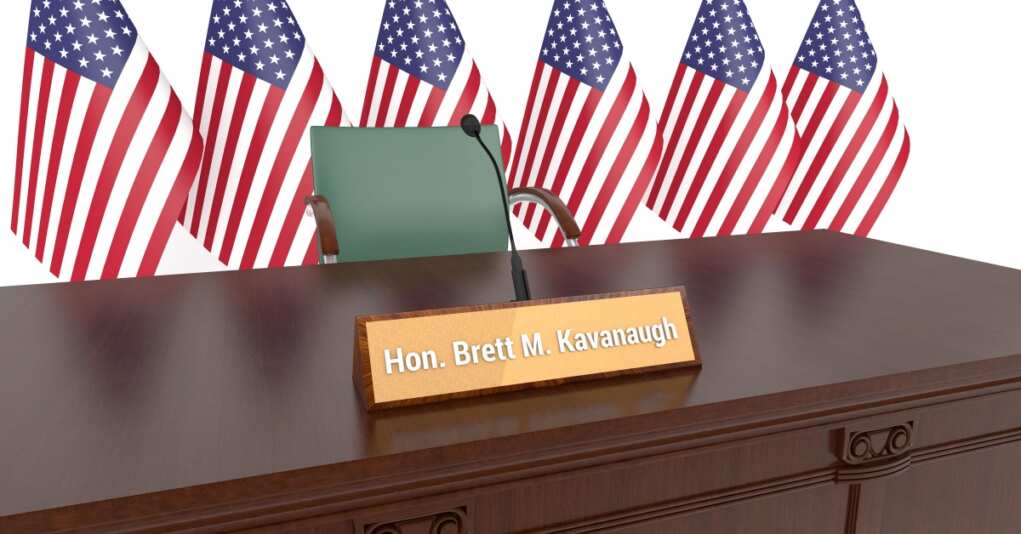Kavanaugh Weighed Presidential Immunity in the Past, and It May Not Be Good News for the Witch Hunt

As the Supreme Court of the United States weighs a decision on former President Donald Trump’s immunity claims for actions he took as president, Democrats are growing worried that their lawfare is once again poised to implode.
And they have good reason to worry. The claim is nothing new for conservative Justice Brett Kavanaugh, who wrote a detailed review of presidential immunity in 2009.
Titled “Separation of Powers During the Forty-Fourth Presidency and Beyond.,” the review could shed light on how Kavanaugh may rule on the case, and it’s a sign that things may not go as the left had planned. But it’s not a party for Trump, either.
Kavanaugh published the Minnesota Law Review article as a U.S. Circuit Court judge. In the article, Kavanaugh suggests that the president’s job is challenging and that a president should be allowed to “focus on his never-ending tasks with as few distractions as possible.”
One of these distractions, Kavanaugh noted in the article, includes criminal prosecution of a president while he is in office.
Kavanaugh argues that it’s not about elevating the President beyond legal accountability or removing checks on presidential power. Instead, Kavanaugh suggests delaying legal proceedings and investigations until the President leaves office. He argues this is crucial for enabling the President to fulfill their duties without the distraction of litigation effectively. While recognizing the necessity of safeguarding against a President who behaves improperly or breaks the law, Kavanaugh asserts that the Constitution already incorporates such checks and balances.
“If the President does something dastardly, the impeachment process is available,” Kavanaugh writes. “No single prosecutor, judge, or jury should be able to accomplish what the Constitution assigns to the Congress. Moreover, an impeached and removed President is still subject to criminal prosecution afterward.”
And that is the heart of the matter. Trump’s attorneys say that the former president could only be held criminally accountable for actions taken while in office if Congress had impeached him for those actions.
But others disagree with Kavanaugh’s conclusions. Jonathan Entin, a retired professor of constitutional law at Case Western Reserve University who worked closely with former Supreme Court Justice Ruth Bader Ginsburg, interpreted Kavanaugh’s review as indicating that the President cannot be indicted or prosecuted while in office, rather than specifically endorsing the argument that a President must first be impeached and removed before facing prosecution.
Entin further suggested that rather than directly addressing whether impeachment and removal are necessary to dismiss claims of immunity, Kavanaugh and other conservative justices might be considering establishing clear guidelines for when immunity applies or creating a general standard to evaluate such claims. He explained that during oral arguments, those discussing potential future prosecutions seemed interested in setting a definitive boundary, indicating which presidential actions could be subject to prosecution while granting immunity for others. Entin noted that conservative justices appeared more focused on how their decision would impact future cases rather than solely examining the current situation.
Although Entin acknowledged the possibility of partisan influences, he believes the Supreme Court is unlikely to resolve the issue of presidential immunity fully. He anticipates a decision where the majority of justices, likely the six appointed by Republicans, would send the case back to lower courts. While not a complete victory for Trump, this outcome would delay a final resolution. Entin predicts a split decision, with three justices appointed by Democrats dissenting against the decision to remand the case to lower courts.
Conservative justices may be willing to offer Trump a partial victory. Justice D. John Sauer argues that presidential immunity from criminal prosecution is vital for maintaining the presidency as we know it. He contends that the executive must have broad discretion without fear of reprisals from political opponents after leaving office. Sauer sees an active executive as crucial for safeguarding liberty in America. He warns that prosecuting former presidents would hinder bold decision-making when needed most. Sauer portrays immunity for official acts as essential for the presidency and cautions against deviating from this norm.
However, even Sauer had to acknowledge that many of Trump’s charges were “private actions” and that he could be held accountable. However, the bigger question facing the SCOTUS is whether he used his presidential power for personal benefit and whether those actions would be covered under “presidential immunity.”
It’s a case that seems increasingly less likely to be resolved ahead of the 2024 election despite Democrats’ best-laid plans. It’s the latest hiccup in what seemed the perfect storm of litigation against Biden’s political rival, and it’s not ending soon enough to benefit the President in the upcoming election.
It may be time to unleash the next pandemic.









